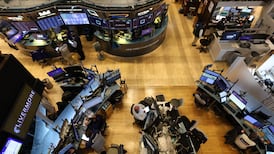THE BIG department stores in Manhattan are a good measure of the economy, not just in America but in the rest of the world too.
Not so long ago, if you closed your eyes for a moment in the lobby of Macy's on 34th Street and Broadway, and listened to the shoppers chatter, you would be forgiven for thinking you had been transported to Dublin.
Irish shoppers invaded New York in record numbers last year as they took advantage of the sinking dollar to snap up bargains for their families back home. And the Irish were not alone. Travellers from all over the globe spent $8 billion in US shops in 2007.
But all that has changed. The euro has taken a dive, foreign travel has dried up and American retailers are suffering in spades.
"It may only be a drop in the bucket in terms of overall retail spending in America but that $8 billion meant a lot to New York retailers like Tiffany," said David Wyss, chief economist at Standard & Poor's. "Foreign travel and foreign retail spending was boosted by the weakness of the dollar but that has reversed in the past two to three months."
Turning off the foreign shopping spigot could not have come at a worse time for retailers. Consumer sentiment and activity are at an all-time low as the US slides towards a long and deep recession. Consumer spending carries a much greater significance in the US than almost any other country as it accounts for some 70 per cent of the nation's entire economy.
US retail sales took a record 2.8 per cent dive last month and the Deloitte Research consumer spending survey turned negative for the first time since 1980.
In recent months high street names like Circuit City, an electronics retailer, and Linens and Things, a homewares chain, are among 22 big retailers that have filed for bankruptcy protection.
Standard & Poor's has so far downgraded the credit ratings of 53 American retailers, surpassing the total for 2007, and analysts expect many more by year's end.
The crowds are certainly thinning out on Fifth Avenue, and in shopping malls all over the US. But the busiest shopping season of the year is still ahead. It begins tomorrow on "Black Friday", the day after Thanksgiving, when retailers slash prices in an annual effort to clear their old stock.
But nobody is expecting this year to be much of a boon. One big research firm expects holiday shopping traffic to plunge by a record 9.9 per cent as the weak economy and low consumer confidence sour the mood for retail.
ShopperTrak, which also sees a record low increase in sales during the same period of 0.1 per cent, said retailers have experienced a "perfect storm" of high petrol prices, collapsing stock markets and a presidential election that distracted shoppers.
"Due to numerous factors that retailers can not control, 2008 has been a challenging year and it seems this pattern will continue throughout the crucial holiday shopping season," Bill Martin, co-founder of ShopperTrak, said. "We are anticipating the lowest retail sales and total US traffic numbers we've seen since we started compiling data in 2001."
To make matters worse this year is a particularly short holiday shopping season with just 27 shopping days between Thanksgiving and Christmas.
Wilbur Ross runs one of America's best-known vulture funds, WL Ross Co. He knows a thing or two about downturns as his firm is a bottom feeder that thrives on picking up companies on the cheap during economic troughs.
But Mr Ross has never seen it so bad for the consumer economy and believes the big retail downturn could hobble the US economy for the next year or two.
"Just as rising markets had created a 'wealth effect' when people felt more prosperous and therefore spent more, declines have a 'poverty effect' making people reluctant to spend," Mr Ross said. "This may affect the economy negatively by $250 to $300 billion over a one-to two-year period."
But there is one retailer bucking the downward trend - and no prizes for guessing which one.
Wal-Mart shares are motoring upwards as all around it sink faster than a Somali pirate ship confronted by the Indian navy. While US October retail sales were the worst in living memory, Wal-Mart enjoyed a 2.4 per cent increase in revenue in the same period.
Wal-Mart's pile 'em high, sell 'em cheap ethos almost guarantees success in lean times. "It is our time. We are well prepared at Wal-Mart," its CEO Lee Scott said. "When our customer is feeling the pressure of a tough economy, Wal-Mart's price leadership is more important than ever.










